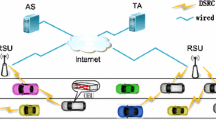Abstract
Vehicular Ad Hoc Network (VANET) is a special application of traditional Mobile Ad Hoc Network (MANET) in traffic roads, which has attracted extensive attention due to its important role in intelligent traffic and road services. In order to ensure the safety of road traffic and protect the privacy of users, it is of vital importance to provide effective anonymous authentication in VANET. In this paper, we propose an efficient mutual authentication framework with conditional privacy protection (EMAPP), which can achieve the security authentication from vehicles to infrastructure and vehicles to vehicles. In the proposed framework, we are combined with pseudo ID and temporary pseudonym to protect the privacy of vehicles, and use the identity-based signature scheme to achieve authentication between vehicles and infrastructure. At the same time, with the assistance of the roadside unit (RSU), we utilize an online/offline signature scheme to achieve authentication between vehicles in the same RSU area and different RSU area. Our scheme has reusability, and we have conducted a performance evaluation. Without expensive and time-consuming operations such as bilinear pairing and mapping to point (MTP) functions, our framework can produce better performance and is appropriate for practical application. In addition, we also use the Internet Security Protocol and Application Automatic Authentication (AVISPA) tools to provide formal security analysis.
Access this chapter
Tax calculation will be finalised at checkout
Purchases are for personal use only
Similar content being viewed by others
References
Armando, A., et al.: The AVISPA tool for the automated validation of internet security protocols and applications. In: Etessami, K., Rajamani, S.K. (eds.) CAV 2005. LNCS, vol. 3576, pp. 281–285. Springer, Heidelberg (2005). https://doi.org/10.1007/11513988_27
Bariah, L., Shehada, D., Salahat, E., Yeun, C.Y.: Recent advances in VANET security: a survey. In: 2015 IEEE 82nd Vehicular Technology Conference (VTC2015-Fall), pp. 1–7, September 2015. https://doi.org/10.1109/VTCFall.2015.7391111
Chikhaoui, O., Ben Chehida Douss, A., Abassi, R., Guemara El Fatmi, S.: Towards the formal validation of a ticket-based authentication scheme for VANETS. In: 2018 32nd International Conference on Advanced Information Networking and Applications Workshops (WAINA), pp. 496–501, May 2018. https://doi.org/10.1109/WAINA.2018.00134
Chikhaoui, O., Chehida, A.B., Abassi, R., Fatmi, S.G.E.: A ticket-based authentication scheme for VANETs preserving privacy. In: Puliafito, A., Bruneo, D., Distefano, S., Longo, F. (eds.) ADHOC-NOW 2017. LNCS, vol. 10517, pp. 77–91. Springer, Cham (2017). https://doi.org/10.1007/978-3-319-67910-5_7
Liu, D., Zhang, S., Zhong, H., Shi, R., Wang, Y.: An efficient identity-based online/offline signature scheme without key escrow. Int. J. Netw. Secur. 19, 127–137 (2017). https://doi.org/10.6633/IJNS.201701.19(1).14
He, D., Zeadally, S., Xu, B., Huang, X.: An efficient identity-based conditional privacy-preserving authentication scheme for vehicular ad hoc networks. IEEE Trans. Inf. Forensics Secur. 10(12), 2681–2691 (2015). https://doi.org/10.1109/TIFS.2015.2473820
Horng, S.J., Tzeng, S.F., Huang, P.H., Wang, X., Li, T., Khan, K.: An efficient certificateless aggregate signature with conditional privacy-preserving for vehicular sensor networks. Inf. Sci. 317, 48–66 (2015). https://doi.org/10.1016/j.ins.2015.04.033
Hubaux, J.P., Capkun, S., Luo, J.: The security and privacy of smart vehicles. IEEE Secur. Priv. 2(3), 49–55 (2004). https://doi.org/10.1109/MSP.2004.26
Li, J., Lu, H., Guizani, M.: ACPN: a novel authentication framework with conditional privacy-preservation and non-repudiation for VANETs. IEEE Trans. Parallel Distrib. Syst. 26(4), 938–948 (2015). https://doi.org/10.1109/TPDS.2014.2308215
Liu, X., Fang, Z., Shi, L.: Securing vehicular ad hoc networks. In: 2007 2nd International Conference on Pervasive Computing and Applications, pp. 424–429, July 2007. https://doi.org/10.1109/ICPCA.2007.4365481
Liu, Y., Wang, L., Chen, H.: Message authentication using proxy vehicles in vehicular ad hoc networks. IEEE Trans. Veh. Technol. 64(8), 3697–3710 (2015). https://doi.org/10.1109/TVT.2014.2358633
Lu, R., Lin, X., Zhu, H., Ho, P., Shen, X.: ECPP: efficient conditional privacy preservation protocol for secure vehicular communications. In: IEEE INFOCOM 2008 - The 27th Conference on Computer Communications, pp. 1229–1237, April 2008. https://doi.org/10.1109/INFOCOM.2008.179
Bellare, M., Namprempre, C., Neven, G.: Security proofs for identity-based identification and signature schemes. J. Cryptol. 22, 1–61 (2009). https://doi.org/10.1007/s00145-008-9028-8
Ming, Y., Cheng, H.: Efficient certificateless conditional privacy-preserving authentication scheme in VANETs. Mob. Inf. Syst. 2019, 19 (2019). https://doi.org/10.1155/2019/7593138
Oh, H., Yae, C., Ahn, D., Cho, H.: 5.8 GHz DSRC packet communication system for ITS services. In: Gateway to 21st Century Communications Village. VTC 1999-Fall. IEEE VTS 50th Vehicular Technology Conference (Cat. No. 99CH36324), vol. 4, pp. 2223–2227, September 1999. https://doi.org/10.1109/VETECF.1999.797333
Yasmin, R., Ritter, E., Wang, G.: Provable security of a pairing-free one-pass authenticated key establishment protocol for wireless sensor networks. Int. J. Inf. Secur. 13, 453–465 (2014). https://doi.org/10.1007/s10207-013-0224-7
Sun, C., Liu, J., Xu, X., Ma, J.: A privacy-preserving mutual authentication resisting DoS attacks in VANETs. IEEE Access 5, 24012–24022 (2017). https://doi.org/10.1109/ACCESS.2017.2768499
Acknowledgement
This work is supported in part by National Natural Science Foundation of China(Nos. 61572349, 61872262).
Author information
Authors and Affiliations
Corresponding author
Editor information
Editors and Affiliations
Rights and permissions
Copyright information
© 2019 ICST Institute for Computer Sciences, Social Informatics and Telecommunications Engineering
About this paper
Cite this paper
Wang, Y., Hu, J., Li, X., Feng, Z. (2019). An Efficient Mutual Authentication Framework with Conditional Privacy Protection in VANET. In: Wang, X., Gao, H., Iqbal, M., Min, G. (eds) Collaborative Computing: Networking, Applications and Worksharing. CollaborateCom 2019. Lecture Notes of the Institute for Computer Sciences, Social Informatics and Telecommunications Engineering, vol 292. Springer, Cham. https://doi.org/10.1007/978-3-030-30146-0_53
Download citation
DOI: https://doi.org/10.1007/978-3-030-30146-0_53
Published:
Publisher Name: Springer, Cham
Print ISBN: 978-3-030-30145-3
Online ISBN: 978-3-030-30146-0
eBook Packages: Computer ScienceComputer Science (R0)




